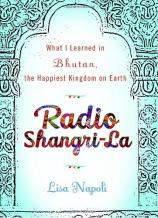Radio Shangri-la: What I Learned in Bhutan, the Happiest Kingdom on Earth
Review
Radio Shangri-la: What I Learned in Bhutan, the Happiest Kingdom on Earth
Bhutan is a country where output is measured not in how many
widgets are sold, but in how good the citizens feel. The mythical
Shangri-La is a tiny isolated kingdom in the Himalayas where strife
does not exist, and people don't long for what they don't
have. Or so we are told.
Lisa Napoli is a forty-something American who decided to take a
chance on love, friendship and new directions with a major change
of scene: from NPR and the New York Times to the humble
Bhutanese radio station Kuzoo FM.
RADIO SHANGRI-LA is an open-hearted portrait of Napoli's own
struggles to understand Bhutan and learn to enjoy its special
qualities amid the swirl of her personal history and the changes
that were creeping in to the country with people like herself
coming in. She was a big help to Kuzoo, but also often just a
bemused observer. She found Bhutanese young people charming, yet
keener than it first appears to secure the blessings of the outside
world, referencing "their odd brand of innocence, and their
newfound worldliness spurred by the infiltration of their borders."
For most of its history, Bhutan was safe from outsiders because it
was just too hard to get to; but the "Gross National Happiness"
initiative of the last few years has been a significant draw to a
certain kind of tourist.
Still, with a "tourist tax" of $250 per day, limited air service
and very little ground transportation once you get there, visiting
the landlocked mountainous country can be daunting. And once inside
its borders, there are few goods or services that would be
recognizable to any but the most toughened trekker. Napoli
informs us, though, that is changing gradually. More facilities
geared to western visitors will be developed in the coming years,
and with radio, TV and the Internet, no country need be shut off
completely from the rest of the world anymore.
Certainly the young Bhutanese embrace technology, and many,
Napoli found out, would gladly leave their birthplace for the
chance to work as illegal menials in the US and send money
home. She learned this when she invited a good friend for a
visit in the US; the young woman disappeared, and though Napoli
never got the whole story, she herself was blamed, though in a
kindly way, for having helped the girl get to the US in the first
place. The story had a happy, rather Bhutanese ending: her friend
returned home, married and had a baby, to whom Napoli is the
godmother. But the basic fact remains that the lure of cash and
what it will purchase is strong, and no amount of emphasis on Gross
National Happiness can quell that thirst.
Napoli learned that young Bhutanese do not so much practice
Buddhism as its rituals because their families do so. Valentine's
Day is a western tradition that has nearly as much enthusiasm in
Bhutan as any Buddhist holy day, and there are cries for Christmas
"so we can get presents." Yet the king, his wives, and the temples
and blessings of the lamas are still powerful symbols, and despite
a wish to beef up tourism as the only logical means of increasing
the country's revenues, a decree was recently issued to retain the
absurd daily tax on visitors. The effect will be that all Bhutan's
tourists will continue to confirm their wildest conjectures of what
a westerner is like: able to throw money around like a maharaja,
requiring special accommodation and transportation.
Still, Napoli brought back from Bhutan a sense of inner peace
that she probably could not have acquired in any other place.
Returning after several trips, she says, "I wasn't waiting for
something to fall into place so that life could get started. Life
was brimming all around me. And now I understood that what I gave
was more important than what I got."
Reviewed by Barbara Bamberger Scott on March 28, 2011
Radio Shangri-la: What I Learned in Bhutan, the Happiest Kingdom on Earth
- Publication Date: February 8, 2011
- Genres: Nonfiction, Travel
- Hardcover: 304 pages
- Publisher: Crown
- ISBN-10: 0307453022
- ISBN-13: 9780307453020





